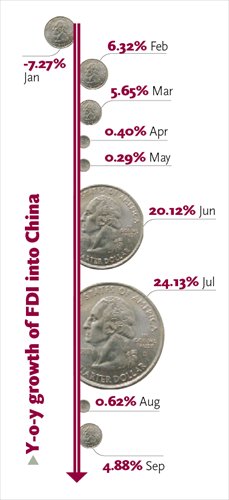China. Overseas investment outpacing FDI inflow
2013-10-18 11:23:13

China's outbound investment grew much faster than foreign direct investment (FDI) flowing into the country in the first nine months of this year, partly because domestic firms are eager to expand overseas, the Ministry of Commerce said Thursday.
Non-financial FDI in the world's second-largest economy reached $8.84 billion in September, up 4.9 percent year-on-year, with total FDI in the first nine months of 2013 reaching $88.6 billion, an increase of 6.22 percent from a year ago, Shen Danyang, spokesman for the ministry, said at a press conference in Beijing.
Compared with this relatively modest growth, outbound direct investment (ODI) by Chinese companies rose by 17.4 percent year-on-year to $61.64 billion for the first three quarters.
China has seen a slowdown and even a decline in inbound FDI in recent years. In 2012, each month saw negative year-on-year growth except May, and January 2013 extended the negative trend. Only since February has year-on-year growth returned.
"It is mainly due to the appreciation of the yuan and soaring labor costs, which increased the investment costs for foreign investors and prompted them to transfer some labor-intensive and low-end manufacturing out of China," Liu Xiao, a macroeconomics analyst at Beijing-based Anbound Consulting, told the Global Times Thursday.
Some American and European investors have also been eager to close overseas subsidiaries in order to survive the current difficult times in the US and European markets, which also led to a slowdown of FDI in China, he said.
With the US and European economy expected to recover gradually, FDI into China is likely to improve, Liu said, although not by a significant amount, as the upward cost trend in China is irreversible.
Potential capital outflows caused by expectations that the US will pull back from its quantitative easing (QE) measures in the future may have a limited impact on foreign investment in China, Alfred Schipke, senior resident representative of China at the IMF, told the Global Times on Thursday.
If capital flows out of Southeast Asian nations because of a US pullback from QE, causing a depreciation of local currencies, these countries would be under pressure and eager to attract Chinese capital and investment, as the yuan is a popular asset in the Asia Pacific region, Liu said.
Despite the FDI slowdown, there are growing opportunities for Chinese firms to expand overseas, he noted.
Energy and mining investments usually made by large State-owned companies accounted for 70 percent of China's ODI from 2005 to the first half of 2013, but private capital has also been seeking overseas investment opportunities, Ernst & Young said in a report released Tuesday.
"Investment from China in agriculture, technology and consumption-related businesses will see unprecedented growth over the next few years," the report said.
The next five to 10 years will be a golden period for overseas expansion by Chinese enterprises, in areas such as financial services and entertainment, as well as energy, Liu said, noting the example of China's Dalian Wanda Group, which bought American cinema chain AMC Entertainment for $2.6 billion in 2012.